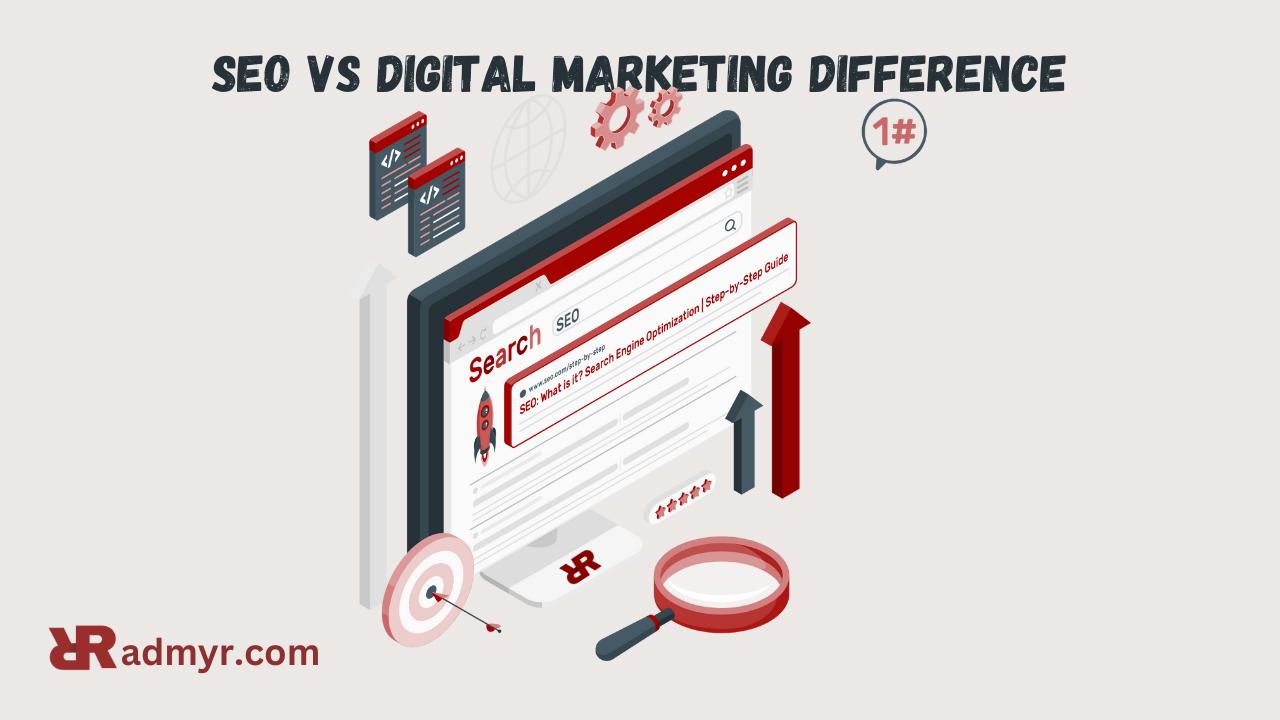One of the most common questions asked by business owners and marketers is: what is the difference between SEO and digital marketing? While these terms are often used interchangeably, they represent different scopes, strategies, and outcomes.
Understanding the SEO vs digital marketing difference is essential for building a growth plan that uses the right tools at the right time. In 2026, when competition online is fiercer than ever, businesses must know how to align SEO with the broader digital marketing ecosystem to maximize visibility, leads, and revenue.
This guide will break down the seo vs digital marketing difference, show how they work together, and explain which strategy is most important depending on business goals.
Defining SEO: Search Engine Optimization
SEO, or search engine optimization, is the practice of optimizing websites and content to appear higher in search engine results. The goal of SEO is simple: increase organic visibility and attract qualified traffic without paying for ads.
Key components of SEO include:
- On-page SEO: Optimizing titles, headings, meta descriptions, and keyword placement.
- Technical SEO: Ensuring fast loading speed, mobile friendliness, crawlability, and proper indexing.
- Content SEO: Publishing keyword-focused, high-value content that matches user intent.
- Off-page SEO: Building backlinks and authority signals from external sites.
- Local SEO: Optimizing Google Business Profile and local citations for nearby customers.
In short, SEO is a subset of digital marketing that focuses on search engines as the primary traffic driver.
Defining Digital Marketing
Digital marketing is a much broader term. It includes every form of online promotion, from SEO to social media, paid advertising, email marketing, influencer partnerships, video marketing, and AI-driven personalization.
Key pillars of digital marketing include:
- SEO (Search Engine Optimization)
- SEM (Search Engine Marketing / Paid Ads)
- Content Marketing (blogs, guides, videos, podcasts)
- Social Media Marketing (Facebook, Instagram, TikTok, LinkedIn)
- Email & Marketing Automation
- Affiliate & Influencer Marketing
- Analytics & Data-driven Campaigns
When analyzing the seo vs digital marketing difference, it becomes clear: SEO is one channel, while digital marketing is the entire strategy that combines multiple channels.
The Core SEO vs Digital Marketing Difference
- Scope
- SEO = Focused on improving organic rankings in search engines.
- Digital Marketing = Covers all online channels, including SEO, paid ads, social, and email.
- Timeframe
- SEO = Long-term strategy, usually takes 3–6 months to see results.
- Digital Marketing = Can deliver both short-term (ads) and long-term (branding) results.
- Cost
- SEO = Requires investment in content, optimization, and tools, but no direct ad spend.
- Digital Marketing = Often involves paid advertising budgets in addition to content and tools.
- Goal
- SEO = Drive organic traffic from search engines.
- Digital Marketing = Drive traffic, leads, and sales from multiple online channels.
👉 Put simply: SEO is one piece of the puzzle; digital marketing is the entire puzzle.
Why Businesses Confuse SEO with Digital Marketing
Many small businesses think SEO and digital marketing are the same because SEO often drives the most visible results in the beginning. However, SEO alone cannot sustain all business growth needs.
For example:
- A restaurant might rely on local SEO to appear in “near me” searches.
- But to launch a new menu quickly, it needs social ads and email marketing — both part of digital marketing.
Understanding the seo vs digital marketing difference helps businesses allocate budgets wisely.
Practical Applications of SEO vs Digital Marketing Difference
Understanding the SEO vs digital marketing difference is useful, but what truly matters for business owners and marketers is knowing when to use each, how to combine them, and which delivers the best ROI depending on the situation. In this section, we’ll explore practical applications, real-world examples, and actionable insights so that businesses can make informed decisions.
When SEO Is the Best Strategy
SEO works best when the goal is to build long-term, sustainable visibility in search results without relying on constant ad spend.
Ideal Scenarios for SEO:
- Local Businesses Wanting Foot Traffic
- Example: A dental clinic optimizing Google Business Profile to rank for “dentist near me”.
- Why: Local SEO brings in consistent customers who are already searching with intent.
- Content-Driven Brands
- Example: A financial consulting firm publishing weekly guides around “small business tax tips”.
- Why: SEO builds authority, attracts leads, and positions the brand as a trusted expert.
- E-Commerce Brands Targeting Long-Tail Keywords
- Example: A shoe store optimizing for “best running shoes for flat feet 2026”.
- Why: Long-tail keywords have high purchase intent and face lower competition.
👉 Key takeaway: SEO is ideal for capturing users actively searching for your product or service.
When Digital Marketing Outperforms SEO
While SEO is powerful, sometimes broader digital marketing strategies are better suited — especially when time, competition, or audience behavior requires speed and diversity.
Best Use Cases for Digital Marketing:
- Product Launches and Quick Wins
- Example: A bakery launching a seasonal cake ad campaign on Facebook and Instagram.
- Why: SEO takes months to rank, but social ads drive immediate awareness and sales.
- Audience Building Beyond Search Engines
- Example: A fitness studio using TikTok content, Instagram Reels, and influencer partnerships.
- Why: Customers may not search for “workout classes near me” but will engage when they see appealing videos in their feed.
- Nurturing Customer Relationships
- Example: A SaaS startup using email automation to onboard new users and keep them engaged.
- Why: Digital marketing strategies like email and remarketing ads keep leads active until they’re ready to buy.
👉 Key takeaway: Digital marketing delivers multi-channel visibility and faster results when SEO alone isn’t enough.
How SEO and Digital Marketing Work Together
The seo vs digital marketing difference is important, but the reality is: they are strongest when combined.
Complementary Strategies:
- SEO + Content Marketing → Attracts organic traffic through blog posts, then repurposes them into newsletters and social posts.
- SEO + Paid Ads → Target keywords with ads while SEO builds long-term authority. Once SEO ranks, reduce ad spend and reinvest savings elsewhere.
- SEO + Social Media → SEO drives users to articles, while social boosts content visibility and generates shares that indirectly improve rankings.
- SEO + Email Marketing → Optimize landing pages for search, then capture leads to nurture via email workflows.
Example Workflow:
- A home décor store writes an SEO-optimized blog post about “best interior design trends 2026.”
- The blog ranks in Google (SEO), gets shared on Instagram (social media marketing), drives traffic to a landing page (PPC ad support), and then captures emails for follow-up promotions (email automation).
This synergy demonstrates that while the seo vs digital marketing difference exists, the two work best as parts of one holistic strategy.
Budget Considerations
Many small businesses ask: Should I invest more in SEO or in broader digital marketing?
- Low Budget / Long-Term Focus → Prioritize SEO. It compounds over time and provides “free” traffic.
- Medium Budget / Balanced Growth → Split investment: SEO for organic growth, digital ads for short-term results.
- Higher Budget / Rapid Expansion → Combine SEO, PPC, content marketing, and automation for full visibility.
👉 The smartest approach is phased investment — start with SEO to build a foundation, then layer in paid and social campaigns as revenue grows.
Future Trends, Long-Term Benefits, and a Practical Framework
Understanding the SEO vs digital marketing difference isn’t only about today’s strategies — it’s also about preparing for where the digital landscape is headed. In this section, the focus is on future trends, sustainable advantages, and a decision-making framework small and large businesses can use.
Future Trends in SEO vs Digital Marketing
1. AI-Driven SEO Optimization
Artificial intelligence is revolutionizing SEO. Tools are now capable of analyzing search intent, semantic relationships, and predictive ranking factors faster than any human team. Platforms like Semrush and Ahrefs already use AI to recommend keywords and track ranking opportunities. In 2026 and beyond, businesses that adopt AI SEO assistants will stay ahead of algorithm changes.
2. The Rise of Omnichannel Marketing
Digital marketing is no longer siloed. SEO-driven blog content might appear in Google search, repurposed as LinkedIn articles, adapted into TikTok videos, and then re-used in email campaigns. This omnichannel approach ensures brands remain visible wherever customers spend time. According to HubSpot Research, companies using integrated omnichannel strategies achieve 91% higher year-over-year retention rates than those that don’t.
3. Voice & Visual Search Expansion
Voice queries like “best coffee shop near me open now” and visual searches with Google Lens are becoming mainstream. Businesses must optimize content not only with written keywords but also with conversational phrases and descriptive imagery. The difference between SEO and digital marketing here becomes clear: SEO ensures findability, while digital marketing ensures engagement and conversion once the user lands on your page.
4. Privacy and Data-Driven Marketing
With stricter privacy regulations, third-party cookie tracking is fading out. SEO will become even more valuable as a sustainable, non-invasive traffic source, while digital marketing will shift toward first-party data collection (emails, CRM, loyalty programs). Businesses that combine both will have a clear competitive edge.
Long-Term Benefits of Understanding SEO vs Digital Marketing Difference
- Smarter Budget Allocation – Knowing the difference allows companies to spend strategically: SEO for compounding growth, digital ads for instant reach.
- Balanced Growth – A dual focus prevents over-reliance on any one channel (e.g., only SEO or only paid ads).
- Customer-Centric Strategy – SEO answers questions customers are actively asking; digital marketing engages them across their entire journey.
- Competitive Advantage – Businesses that integrate SEO into their larger digital marketing ecosystem build stronger, more resilient brands.
A Practical Framework for Decision-Making
When choosing between SEO and broader digital marketing, consider:
- Stage of Business
- New startups → need visibility quickly → prioritize digital ads + foundational SEO.
- Growing businesses → need scalable traffic → double down on SEO while adding automation.
- Established companies → need authority + reach → integrate full digital marketing strategy.
- Goals
- Immediate leads → paid campaigns.
- Long-term organic traffic → SEO investment.
- Brand awareness & engagement → combine SEO with social, video, and email.
- Budget
- Low budget → SEO first.
- Medium budget → 50/50 split.
- Larger budget → full funnel integration.
👉 Example: A new online clothing brand might run TikTok ads (digital marketing) for immediate visibility while building SEO-optimized product descriptions and blogs for sustainable traffic.
Final Thoughts
The seo vs digital marketing difference lies in scope and purpose: SEO is a subset, while digital marketing is the umbrella strategy. Both are essential, but the right balance depends on business stage, goals, and budget.
The future belongs to businesses that stop seeing SEO and digital marketing as separate and instead treat them as complementary forces. SEO builds trust and discoverability; digital marketing multiplies reach and nurtures relationships. Together, they create a growth engine for 2026 and beyond.
FAQ: SEO vs Digital Marketing Difference
1) What is the core SEO vs digital marketing difference?
SEO focuses on increasing organic visibility in search engines; digital marketing is the larger umbrella that includes SEO plus paid ads, social media, email, affiliates, and more.
2) Is SEO part of digital marketing or a separate discipline?
SEO is a subset of digital marketing. It’s one channel within a multi‑channel strategy that can also include PPC, social, email, PR, and conversion optimization.
3) Which is better for a small budget: SEO or digital marketing?
If budget is tight and the goal is sustainable traffic, start with SEO foundations (technical fixes, content, local SEO). Layer low‑cost digital tactics (email, retargeting) as you grow.
4) How long does SEO take vs other digital marketing tactics?
SEO typically shows compounding results in 3–6 months. Paid ads and social campaigns can deliver traffic in days to weeks, but stop when spend stops.


Leave a Reply